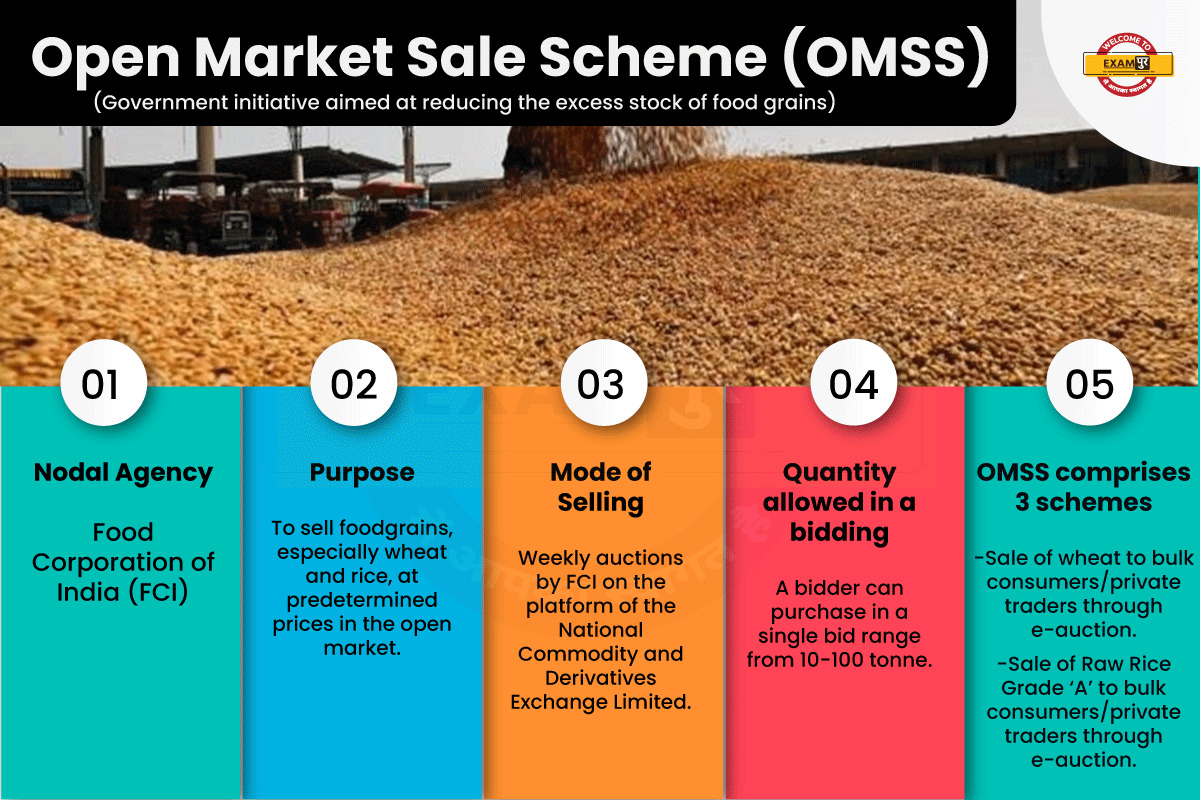The Open Market Sale Scheme for wheat and rice
Context:
The recent developments regarding the Open Market Sale Scheme (OMSS) implemented by the Food Corporation of India (FCI). The FCI imposed quantity restrictions and prohibited states from procuring wheat and rice through OMSS auctions. The government’s objective was to regulate supply and curb inflation. However, states like Karnataka and Tamil Nadu criticized this decision, arguing that it prioritizes political considerations over the welfare of marginalized beneficiaries of state welfare schemes.
Relevance:
- GS-02 (Government Policies and Intervention)
GS-03 (Growth and development, Public Distribution system, Buffer stocks and food security)
Prelims:
- Open Market Sale Scheme (OMSS)
- Food Corporation of India (FCI)
Mains Questions:
- Analyze the reasons behind the imposition of quantity restrictions by the Food Corporation of India (FCI) and the subsequent exclusion of states from procuring through the Open Market Sale Scheme (OMSS). What implications does this decision have on the welfare schemes of the states? (150 words)
Dimensions of the article:
- Imposition of Quantity Restrictions and Exclusion of States from OMSS Auctions
- Understanding the Open Market Sale Scheme (OMSS)
- Revision of OMSS by the Centre
- FCI’s Perspective and Obligations
- State Reactions and Implications
I. Imposition of Quantity Restrictions and Exclusion of States from OMSS Auctions
- The decision by the Food Corporation of India (FCI) to impose quantity restrictions and exclude states from participating in Open Market Sale Scheme (OMSS) auctions has sparked a significant controversy.
- The FCI justified these measures as a means to curb inflation and regulate the supply of essential food grains. However, several states, including Karnataka and Tamil Nadu, have criticized the government, accusing it of prioritizing political considerations over the welfare of marginalized beneficiaries of state welfare schemes.
- The OMSS allows the FCI to sell surplus food grains from the central pool to traders, retail chains, and bulk consumers through e-auctions. States are also permitted to procure food grains through the OMSS, beyond their allotted quantities from the central pool, for distribution to beneficiaries under the National Food Security Act (NFSA).
- However, the recent decision has prevented states from accessing the OMSS supplies, thereby limiting their ability to fulfil their obligations towards welfare schemes that rely on these additional procurements.
II. Understanding the Open Market Sale Scheme (OMSS)
- The Open Market Sale Scheme (OMSS) is a mechanism implemented by the FCI to sell surplus food grains, primarily wheat and rice, from the central pool in the open market.
- Through periodic e-auctions, the FCI offers these food grains to open market bidders, including traders, retail chains, and bulk consumers, at pre-determined prices.
- The OMSS aims to balance the surplus stock of food grains and stabilize prices while ensuring wider accessibility.
III. Revision of OMSS by the Centre
- The recent revision of the OMSS by the Centre involves reducing the quantity that a single bidder can purchase in a single bid. Previously, a buyer could acquire up to 3,000 metric tonnes (MT) per bid, but this has now been modified to a range of 10-100 metric tonnes. The FCI claims that this reduction aims to accommodate more small and marginal buyers, enhancing the scheme’s reach and promoting competition.
- By allowing smaller bids, the revised OMSS intends to break the monopolistic control of bulk buyers and create a more level playing field. The expectation is that increased participation from smaller buyers will foster competitive pricing and prevent price distortions in the retail market.
- However, the effectiveness of this approach remains a subject of debate, as it may pose logistical challenges and potentially disrupt the existing procurement system.
IV. FCI’s Perspective and Obligations
- The Food Corporation of India (FCI) justifies the revision of the OMSS and the exclusion of states from procurement auctions based on its obligations and concerns regarding the welfare of marginalized beneficiaries and common consumers.
- The FCI emphasizes its commitment to distributing food grains to around 80 crore marginalized beneficiaries under the National Food Security Act (NFSA). In addition to meeting these obligations, the FCI also acknowledges its responsibility to consider the concerns of the 60 crore common consumers who are affected by retail prices.
- The FCI contends that the reduction in the quantity a bidder can purchase under the OMSS aims to ensure a wider reach and better accessibility of the scheme. By accommodating more small and marginal buyers, the FCI aims to break the dominance of large buyers and promote fair competition.
V. State Reactions and Implications
- In Karnataka, the Anna Bhagya scheme, which guarantees rice to marginalized families, was a key promise of the Congress government. Leaders from the Congress party have accused the Centre of conspiring to undermine the state government’s poll guarantee by restricting the supply of rice necessary to implement the scheme effectively.
- Similarly, Tamil Nadu has been affected by the discontinuation of OMSS supplies. In response, the state government is actively exploring alternative options to procure 50,000 tonnes of rice from government agencies other than the FCI. The disruption in OMSS supplies has forced Tamil Nadu to seek alternative sources to maintain its commitment of providing rice to all ration card holders.
Way Forward:
In light of the current situation, it is crucial to find a balanced approach that addresses the concerns of both the Centre and the states. A collaborative effort is needed to ensure the smooth functioning of the OMSS while safeguarding the welfare of marginalized beneficiaries.
Conclusion:
The recent developments surrounding the Open Market Sale Scheme (OMSS) have sparked a debate between the Centre and various states. The imposition of quantity restrictions and exclusion of states from OMSS auctions has raised concerns about the impact on welfare schemes and marginalized beneficiaries. It is essential for all stakeholders to engage in constructive dialogue and find a way forward that promotes transparency, efficiency, and inclusivity in the procurement and distribution of food grains.





